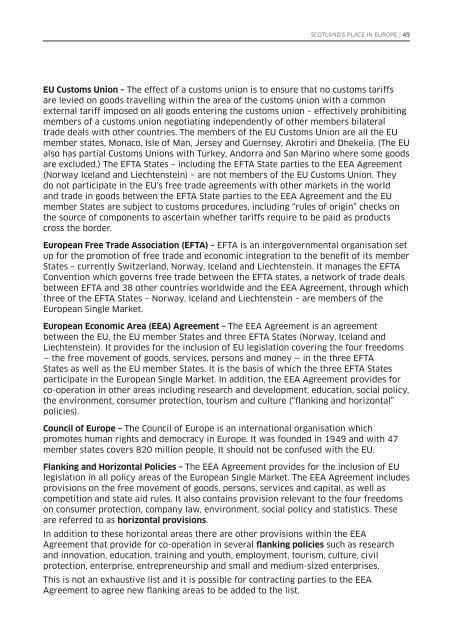Scotland’s Place in Europe
5tSyKxiOE
5tSyKxiOE
Create successful ePaper yourself
Turn your PDF publications into a flip-book with our unique Google optimized e-Paper software.
SCOTLAND’S PLACE IN EUROPE | 49<br />
EU Customs Union – The effect of a customs union is to ensure that no customs tariffs<br />
are levied on goods travell<strong>in</strong>g with<strong>in</strong> the area of the customs union with a common<br />
external tariff imposed on all goods enter<strong>in</strong>g the customs union – effectively prohibit<strong>in</strong>g<br />
members of a customs union negotiat<strong>in</strong>g <strong>in</strong>dependently of other members bilateral<br />
trade deals with other countries. The members of the EU Customs Union are all the EU<br />
member states, Monaco, Isle of Man, Jersey and Guernsey, Akrotiri and Dhekelia. (The EU<br />
also has partial Customs Unions with Turkey, Andorra and San Mar<strong>in</strong>o where some goods<br />
are excluded.) The EFTA States – <strong>in</strong>clud<strong>in</strong>g the EFTA State parties to the EEA Agreement<br />
(Norway Iceland and Liechtenste<strong>in</strong>) – are not members of the EU Customs Union. They<br />
do not participate <strong>in</strong> the EU’s free trade agreements with other markets <strong>in</strong> the world<br />
and trade <strong>in</strong> goods between the EFTA State parties to the EEA Agreement and the EU<br />
member States are subject to customs procedures, <strong>in</strong>clud<strong>in</strong>g “rules of orig<strong>in</strong>” checks on<br />
the source of components to ascerta<strong>in</strong> whether tariffs require to be paid as products<br />
cross the border.<br />
<strong>Europe</strong>an Free Trade Association (EFTA) – EFTA is an <strong>in</strong>tergovernmental organisation set<br />
up for the promotion of free trade and economic <strong>in</strong>tegration to the benefit of its member<br />
States – currently Switzerland, Norway, Iceland and Liechtenste<strong>in</strong>. It manages the EFTA<br />
Convention which governs free trade between the EFTA states, a network of trade deals<br />
between EFTA and 38 other countries worldwide and the EEA Agreement, through which<br />
three of the EFTA States – Norway, Iceland and Liechtenste<strong>in</strong> – are members of the<br />
<strong>Europe</strong>an S<strong>in</strong>gle Market.<br />
<strong>Europe</strong>an Economic Area (EEA) Agreement – The EEA Agreement is an agreement<br />
between the EU, the EU member States and three EFTA States (Norway, Iceland and<br />
Liechtenste<strong>in</strong>). It provides for the <strong>in</strong>clusion of EU legislation cover<strong>in</strong>g the four freedoms<br />
— the free movement of goods, services, persons and money — <strong>in</strong> the three EFTA<br />
States as well as the EU member States. It is the basis of which the three EFTA States<br />
participate <strong>in</strong> the <strong>Europe</strong>an S<strong>in</strong>gle Market. In addition, the EEA Agreement provides for<br />
co-operation <strong>in</strong> other areas <strong>in</strong>clud<strong>in</strong>g research and development, education, social policy,<br />
the environment, consumer protection, tourism and culture (“flank<strong>in</strong>g and horizontal”<br />
policies).<br />
Council of <strong>Europe</strong> – The Council of <strong>Europe</strong> is an <strong>in</strong>ternational organisation which<br />
promotes human rights and democracy <strong>in</strong> <strong>Europe</strong>. It was founded <strong>in</strong> 1949 and with 47<br />
member states covers 820 million people. It should not be confused with the EU.<br />
Flank<strong>in</strong>g and Horizontal Policies – The EEA Agreement provides for the <strong>in</strong>clusion of EU<br />
legislation <strong>in</strong> all policy areas of the <strong>Europe</strong>an S<strong>in</strong>gle Market. The EEA Agreement <strong>in</strong>cludes<br />
provisions on the free movement of goods, persons, services and capital, as well as<br />
competition and state aid rules. It also conta<strong>in</strong>s provision relevant to the four freedoms<br />
on consumer protection, company law, environment, social policy and statistics. These<br />
are referred to as horizontal provisions.<br />
In addition to these horizontal areas there are other provisions with<strong>in</strong> the EEA<br />
Agreement that provide for co-operation <strong>in</strong> several flank<strong>in</strong>g policies such as research<br />
and <strong>in</strong>novation, education, tra<strong>in</strong><strong>in</strong>g and youth, employment, tourism, culture, civil<br />
protection, enterprise, entrepreneurship and small and medium-sized enterprises.<br />
This is not an exhaustive list and it is possible for contract<strong>in</strong>g parties to the EEA<br />
Agreement to agree new flank<strong>in</strong>g areas to be added to the list.


